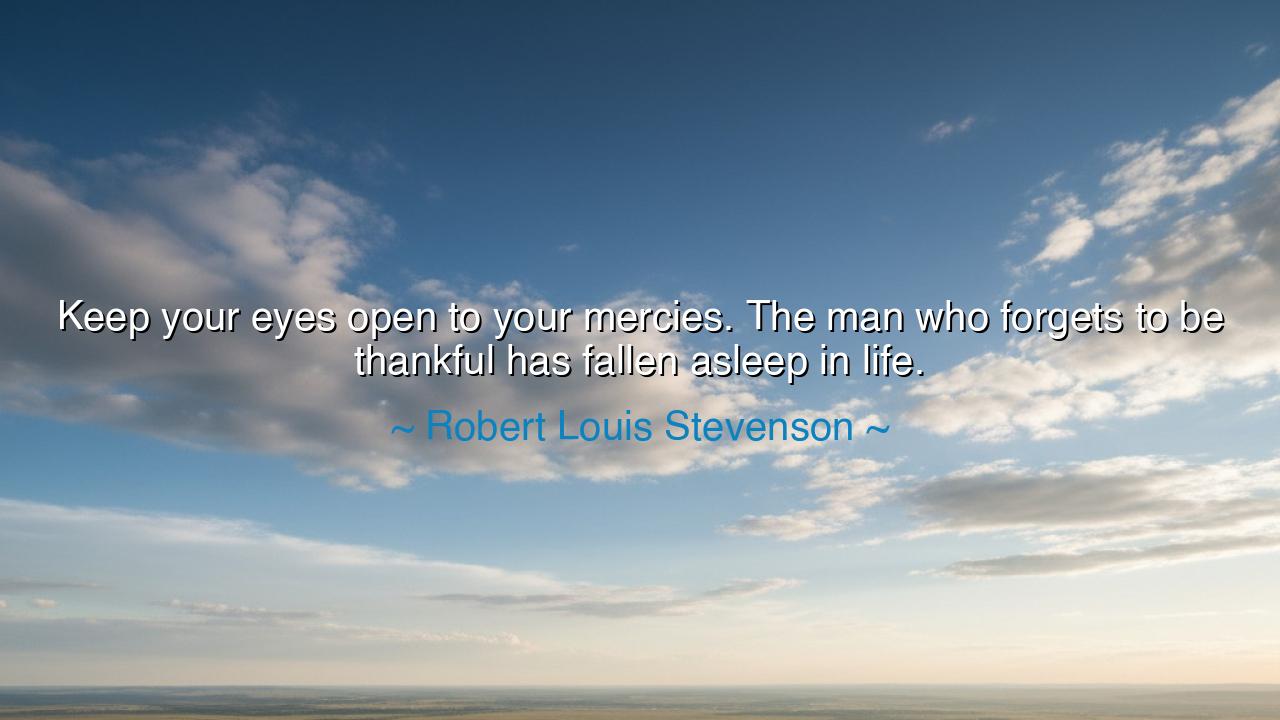
Keep your eyes open to your mercies. The man who forgets to be
Keep your eyes open to your mercies. The man who forgets to be thankful has fallen asleep in life.






Robert Louis Stevenson, poet and pilgrim of the soul, once uttered words that shine like a lamp against the darkness of ingratitude: “Keep your eyes open to your mercies. The man who forgets to be thankful has fallen asleep in life.” This teaching is not a mere suggestion, but a commandment of the heart, a summons to awaken and behold the gifts that surround us. For to live without thankfulness is to wander through the garden of life blind to its blossoms, deaf to its birds, and numb to its fragrance.
To keep your eyes open is to live awake. Every dawn is a mercy, every breath a miracle, every friendship a blessing. Yet men, blinded by their hunger for more, often fail to see the treasures already in their hands. The ancients warned against such blindness: Seneca wrote that we complain of life being short, when in truth it is long enough if lived with awareness. Stevenson echoes this wisdom, reminding us that gratitude is the very pulse of a soul awake to the wonder of existence.
The danger of forgetting gratitude is not small, but grave. The one who ceases to be thankful has, as Stevenson warns, fallen asleep in life. Though he walks and breathes, his spirit slumbers. He no longer marvels at the sky, nor treasures the smile of a friend, nor counts his daily bread as grace. Such a life is not lived, but endured. It is a kind of death-in-life, a wasting of days while awaiting the grave. Gratitude, then, is the light that keeps the heart alive, the fire that burns against the cold of apathy.
History gives us radiant examples of those who lived awake to their mercies. Consider Helen Keller, who though deprived of sight and hearing, saw more beauty and heard more truth than many who have all their senses. She spoke with reverence of the smallest mercies—a touch, a fragrance, a kind word—because her spirit was alive in gratitude. The world honored her not because she lacked burdens, but because she kept her eyes open to blessings greater than her losses.
To be thankful is not merely to say words of thanks, but to live in awareness, to dwell in a spirit of appreciation. Gratitude transforms burdens into lessons, scarcity into sufficiency, and suffering into strength. Even in the hardest trials, thankfulness gives power, for it shifts the gaze from what is lacking to what is present, from despair to hope. As a thirsty traveler sees the smallest cup of water as salvation, so too does the grateful soul see each moment as sacred.
O children of tomorrow, hear this and guard it well: gratitude is the guardian of joy. Practice it daily, and your heart will never sleep. At the rising of the sun, give thanks for its warmth. At the eating of bread, give thanks for the earth and the hands that brought it forth. At the laughter of a friend, give thanks for love that endures. In this way, your spirit will remain awake, sharp, and alive to the mercies that flow like rivers around you.
The lesson is plain: to live without gratitude is not to live at all. Therefore, cultivate a discipline of thankfulness. Each night, remember three mercies that blessed your day. Each morning, begin with a word of thanks, even if for breath alone. These simple acts will awaken your spirit and sharpen your vision, until you see miracles not as rare, but as constant companions.
Thus, let Stevenson’s words echo in your heart: “Keep your eyes open to your mercies.” For life is not measured only by years, but by awakeness of spirit. Stay thankful, stay awake, and your days, however many or few, will be rich with meaning, alive with joy, and luminous with grace.






AAdministratorAdministrator
Welcome, honored guests. Please leave a comment, we will respond soon